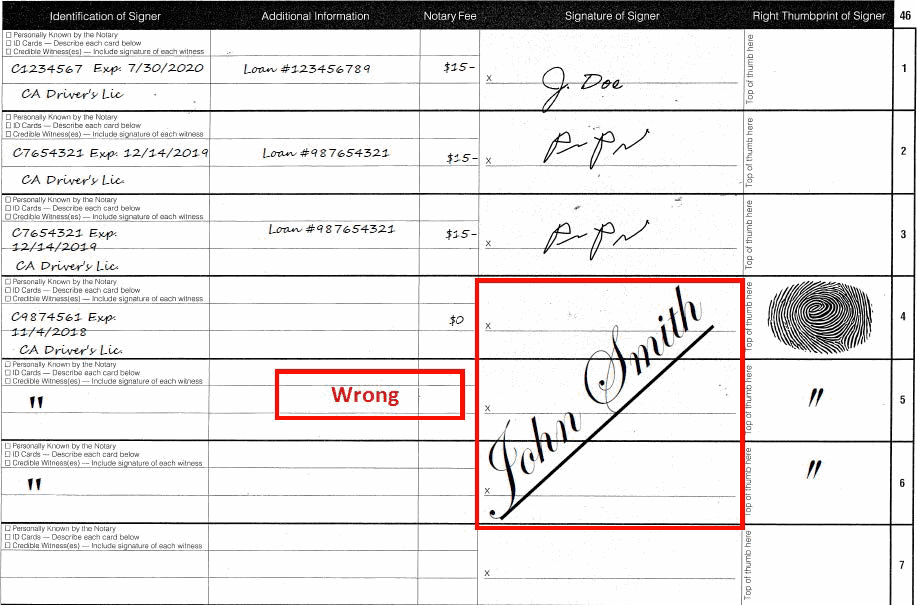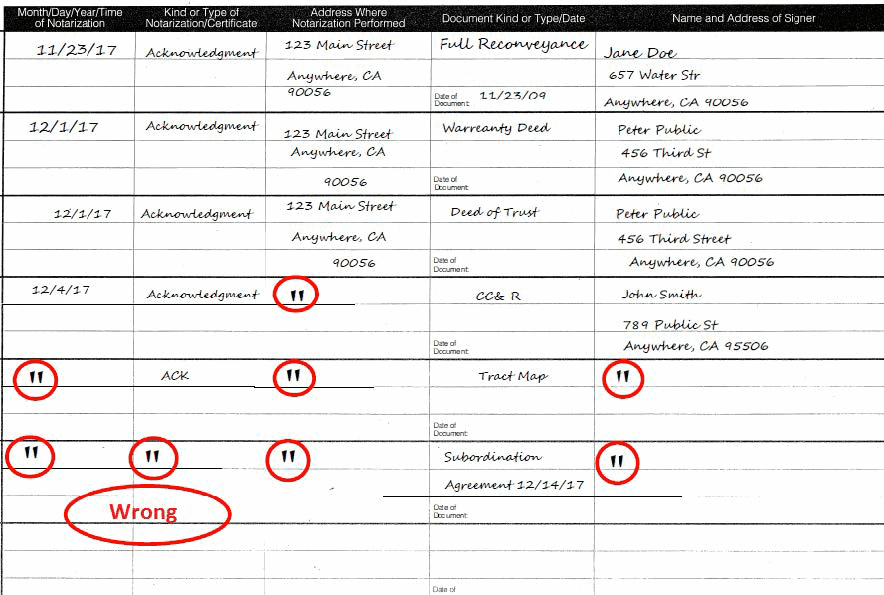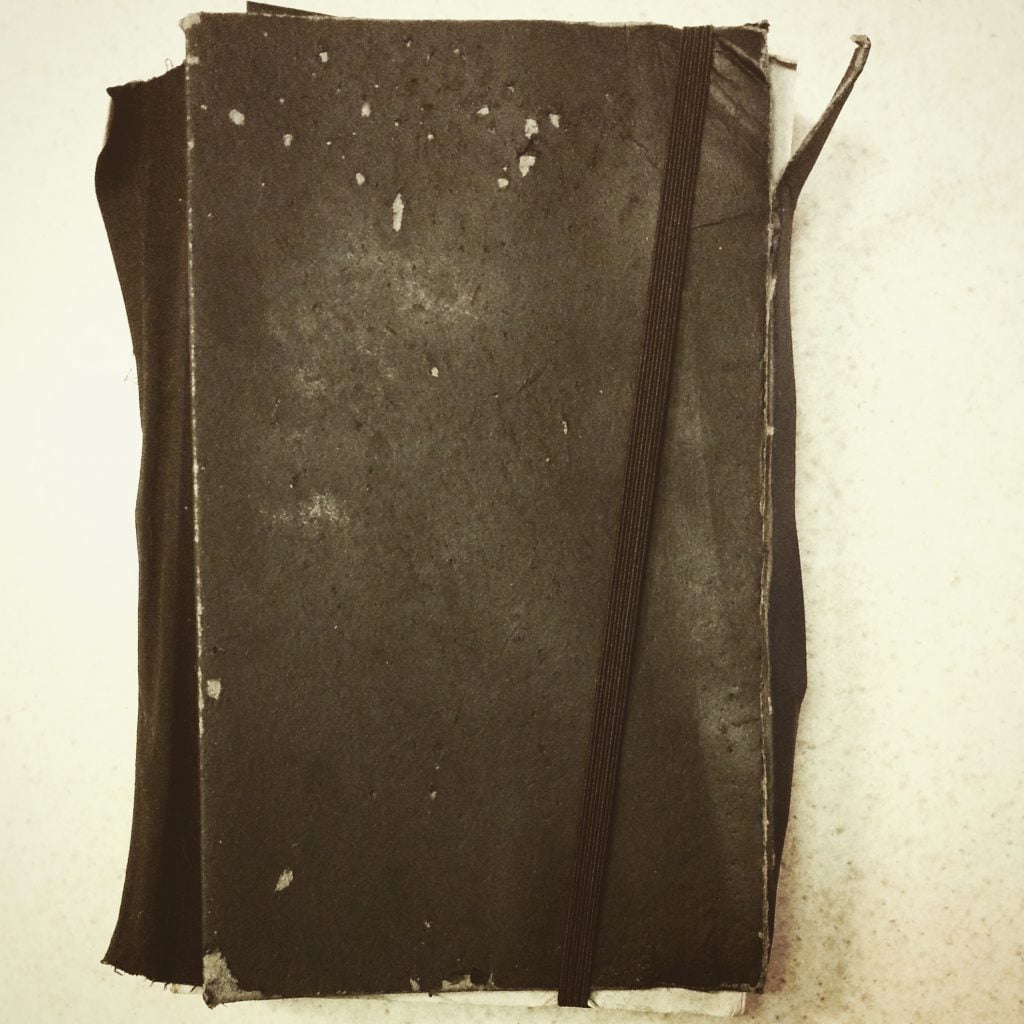
A notary public is responsible for keeping a journal of all the notary acts they perform.
It is very important to correctly maintain your notary public journal. If you don’t, you could get in trouble. State investigators have found that many people do not do this correctly.
As a notary public, you must document every notarial act in your journal. Your journal must only be used to document acts as they happen. Do not use the journal to schedule future appointments for official notarial acts.
Your notary journal is a record of your notary work. Keeping a detailed journal protects you and the people you work with. It is required by law for notaries to document their work each time.
Table of Contents

Only one active journal at a time
A notary public must only keep one journal at a time that has all the notarial acts in it. Keeping more than one journal is never allowed.
For example, if a notary public works at multiple offices, they cannot have a different notarial journal for each office. They must use one journal and take it to each office where they perform a notarial service.

Securing the journal
The journal must be kept in a place where it is safe and secure, such as a locked box or desk drawer.
No one, except for the notary public, can access the notary public’s journal. This includes employers who paid for the journal. The notary public must be present when anyone looks at it.
The notary journal must be stored in a place that is only accessible to the notary public. This could be a locked cabinet, safe, or office that is only accessible to the notary. If other people have access to this area, it is not considered to be under the direct and exclusive control of the notary.
It is not acceptable to keep the journal in a locked desk at home if other family members have access to it. If you don’t secure the journal, you may be suspended or have your commission revoked and may also be subject to civil and criminal penalties.
The notary public must be the only one with control over the journal.
Notarial acts must be recorded sequentially
Notary publics must record all official acts in their active journal. The entries must be written sequentially, one after the other. This is done by recording each act as it occurs.
A notary public who willfully fails to maintain his or her notarial journal is guilty of a misdemeanor.
What to record in the journal
Every notarial act must be recorded in your notary journal. If you do not properly maintain your journal, you can be charged with a misdemeanor.
The journal should include the items below.
- The date and time of each official act. The date and time the notary public performed the notarial service must be recorded. The time may be written in standard or military format, but the law requires the time of the act to be recorded. There are two reasons why you should record the date and time of an official act: the law requires it, and you might need this information as proof of an official act if your journal is audited. You should not enter the date and time of the notarial act until you have actually performed it. The date and time lines in the journal should not be used as an appointment reminder for future appointments. If you enter a future date and time in your journal, but then the notary act doesn’t happen, it will look suspicious if someone audits your journal.
- The type of notarial act that the notary is doing. There are different types of notarial acts, like a proof of execution by a subscribing witness, an acknowledgment, and a jurat. California notaries sometimes confuse the type of notarial act with the type of document. These are not the same. The type of act is the kind of form certificate the notary public uses, like a certificate of acknowledgment or a jurat. Only the type of certificate form should be put in this category. People can ask for a copy of a journal entry that represents a specific transaction. The California Secretary of State, through civil and criminal subpoenas, or by a peace officer investigating a crime, can also ask for copies of specific entries. Your journal entries should be full and complete. Whenever you are a notary, it is important to be clear about what kind of act you are doing. This means that you should never use abbreviations or acronyms when writing in your journal. This will avoid confusion or misunderstandings about the contents of the journal entry and the type of notarial act performed. A journal entry that contains a line filled with indecipherable abbreviations is useless if someone requests a copy of a line item.
- Every instrument sworn, affirmed, acknowledged, or proven before a notary public is identified with its character. The “character” means the type of notarized document. Most notarial acts involve someone else signing or certifying a document. The journal must also include a description of the document and the type of act performed. For example, most signatures on grant deeds are acknowledgments. The journal entry for a grant deed will describe the type of document as a “grant deed” and the type of notarial act as an “acknowledgment.” If more than one document has notarized signatures, the notary public must list each document and the title or character of each document on a separate line. For example, if a California notary public completes an acknowledgment certificate on a deed of trust and on a promissory note, the notary public must record on separate lines in the journal that each document had a notarized signature. The notary public must also write down what type of document it was (deed of trust or promissory note. The notary public is unable to simply state that “loan documents” or “closing papers” were acknowledged. If you were asked about a line item from your journal from three years ago, would you remember what specific document was referenced?
- The signature of each person who is having their signature notarized. Investigators who analyze handwriting sometimes look at signatures to see if they match. If someone signs multiple documents with one line, it can be hard to tell which document that person actually signed. California law says each line in a document should have a signature.

- That the person who is acknowledging something or taking an oath or affirmation has their identity based on “satisfactory evidence.” This is according to Civil Code section 1185. A notary public must always have satisfactory evidence that proves the identity of the person making an oath or affirmation. The journal entry for all oaths, affirmations, and proofs of execution must include a statement saying that satisfactory evidence was obtained.
- If satisfactory evidence is based on paper identification: The journal will contain the type of identifying document, the governmental agency issuing the document, the serial or identifying number of the document, and the date of issue or expiration of the document.
- If satisfactory evidence is based on a single credible witness who is personally known to the notary public, The journal must contain the signature of the credible witness or the type of identification document presented by the credible witness, the governmental agency that issued the identification, and the date the identification document was issued. A best practice is to have the signature of a single credible witness and to also record the identifying document in the journal.
- If satisfactory evidence is based on two credible witnesses whose identities are proven upon the presentation of satisfactory evidence, the journal will have the signatures of the credible witnesses and their identifying documents. The type of document, the name of the issuing government agency, and the serial or identifying number of the document will also be included. The date when the document was issued or expired will be stated.
- The fee for notarizing a document. If no fee is charged, write “0” in the journal. Only list the fees for the notarial act. If there are other charges, like for travel or other services, list them in the “additional information” or “comments” column. This will help to distinguish between notarial act fees and other fees.
- If the document to be notarized is a deed, quitclaim deed, deed of trust, or other document affecting real property, the notary public will ask you to put your thumbprint in the journal. If the right thumbprint is not available, then the notary public shall have the party use his or her left thumb, or any available finger and shall so indicate in the journal. If the person who is signing the document cannot provide a thumbprint or fingerprint, the notary public will write that in the journal and explain why. The thumbprint is not needed for deeds for a decree of foreclosure or nonjudicial foreclosure, or a deed of reconveyance.
If the sequential journal is stolen, lost, misplaced, destroyed, damaged, or otherwise rendered unusable, the notary public must immediately notify the Secretary of State. The notification must include the periods of entries, the notary public commission number, the commission expiration date, and a photocopy of the police report that lists the journal.

No hash marks
If you are notarizing multiple documents for one or more people, each notarial act must be written down in your journal. You cannot use hash marks, ditto marks, arrows, lines, or any other symbols to indicate a notarial act. Everything must be written out in full.
Copying and inspection of journal entries
If somebody requests a copy of a transaction from the notary public’s journal, the notary public must respond within 15 business days by either giving them a photocopy of the line item or an acknowledgment that no such line item exists. The written request must include the names of the parties, what type of document it is, and the month and year it was notarized. The cost to provide this information must not be more than thirty cents ($0.30) per page. However, a member of the public is not allowed to get a copy of all the other things written on the same page in the notary public’s journal. It is important to make sure that only the requested line item entry is shown to them.
The notary public must provide the journal for examination and copying when they receive a subpoena duces tecum or a court order. The notary public must also certify those copies, if requested.

Notary public journal employer considerations
Even if the notary public’s employer pays all of the costs to obtain the notary public’s commission and also pays for all the costs to provide notarial services, the notary cannot let their employer handle the journal outside of their presence. The notary public cannot give their employer the journal when they leave their job.
A notary public must let their employer or the employer’s auditor or agent see and copy journal entries. The notary public must be present when the inspection and copying of journal entries take place. The purpose of the inspection and copying must be related to the employer’s business. If the employer requests it, the notary must provide copies of all journal entries that are related to the employer’s business. The copies must be plain (not certified).
The notary must relinquish the journal or permit inspection and copying of journal transactions under certain circumstances, as specified by Government Code section 8206(d).
Surrender of notary journal
The notary public’s journal is their personal property and they cannot give it to anyone else (except as required by law).
A California notary must give their official journal to a peace officer who has reasonable suspicion the journal contains evidence of a criminal offense and is investigating that criminal offense.
If the notarial journal is surrendered to a peace officer, the notary must get a receipt for it and must tell the California Secretary of State by certified mail or any other physical delivery that provides a receipt within 10 days of when it was surrendered.
The notification must include the dates of the journal entries that are being surrendered, the notary public’s commission number, the expiration date of the notary public’s commission, and a copy of the receipt given by the peace officer.

Loss or damage of notary journal
If a notary public’s journal is lost, destroyed, or otherwise rendered unusable, the notary public must immediately notify the California Secretary of State. They must do this by certified or registered mail or any other means of physical delivery that provides a receipt.
The notification must include the dates of the journal entries, the notary public’s commission number, the expiration date of the notary public’s commission, and a photocopy of any police report that specifies the theft of your journal.
Starting a new journal
If the notary public’s official journal is lost, misplaced, destroyed, damaged, or otherwise rendered unusable, the notary public must get a new journal. If the old journal is found or returned, entries cannot be made in it. The notary public must continue to use the new journal.
The notary should also start a new journal and stop using the current journal when the current journal is full. This ensures that only one active, sequential journal is used.
Surrendering journal on commission end
If a notary resigns, is disqualified, or is removed from office, they must deliver their notarial journal and all other notarial records to the clerk of the county where their oath is on file within 30 days.
If a notary’s commission expires and the notary does not get reappointed within 30 days, then the notarial journal and other records must be delivered to the county clerk within the next 30 days.
If a notary public does not receive a new commission within 30 days after their old commission expires, they must deliver the notarial journal and other notarial records to the county clerk within the next 30 days. This applies even if the notary is in the process of reapplying for a new comission.
If you do not deliver the notarial journal and other notarial records to the county clerk within the appropriate time, it is a misdemeanor. You are also responsible for any damages that are caused to someone because of this.
A notary public who willfully fails to maintain the notary’s journal is guilty of a misdemeanor.
The notary must deliver all notarial journals, records and papers to the county clerk’s office within 30 days from the date the notary commission is no longer valid. If the notary does not do this, they are guilty of a misdemeanor. They will be responsible for any damages caused by their actions or lack thereof. All journals, records and papers given to the Secretary of State will be sent back to the sender.

The Who, What, Why, When and How of the notary journal for California notaries
California notaries should know how to document each and every official act they perform. They need to know what information is required to be recorded in the journal, how to record that information, and why it is important. This way, they can protect their commission and the public.
Make sure you document everything required by law when you are a notary. This includes the when, what, who, and how much for every single line item. You must be very thorough and detailed when writing this information down. California Government Code section 8206 states what information is required for every journal entry.
It is important to keep a journal of all your acts as a notary. This is so you can remember what you did and so you are accurate when reporting your activities. Remember to be thorough, detailed, and accurate when recording the information. This will help you stay safe and protect your notary career!
Where to get a notary journal.
California notaries public can obtain notary journals and notary public stamps from our notary supplies partner. A journal is one of the many costs of being a notary.
How to become a California notary
The first step in becoming a California notary public is to complete notary public education.
